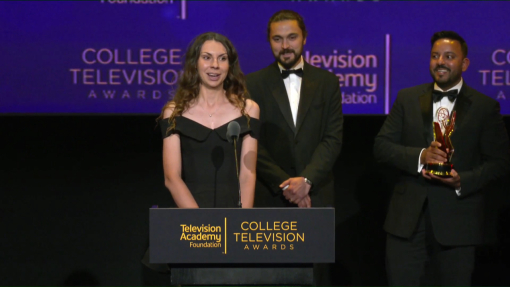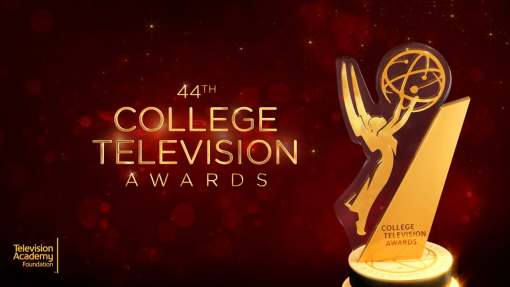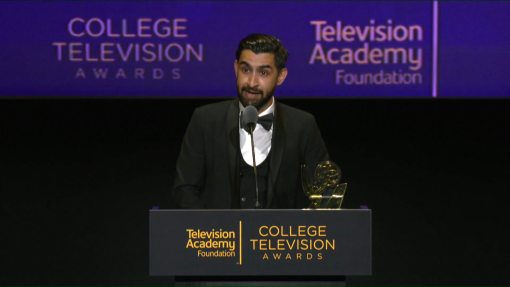During spring break in 2024, a team of 16 student journalists from Montclair State University in New Jersey, accompanied by two professors, traveled to Arizona. There they reported on such topics as the U.S.-Mexico migrant border crisis, water scarcity, student voting and the challenges encountered by Indigenous people. This spring, their resulting program, Arizona Stories: Border, Water, & Politics, proved the big winner at the Television Academy Foundation’s 44th College Television Awards, announced April 5 at a ceremony at the Academy’s Saban Media Center in the NoHo Arts District.
The report won in the News category and took the top honor, the Seymour Bricker Humanitarian Award, given to the winning piece that best represents a humanitarian cause.
“We're completely humbled to be able to accept this award,” said Dani Mazariegos in accepting the Bricker Award. “Many of us are children of immigrants. We are just incredibly taken away that we were given this opportunity to platform important stories of communities that we are a part of, and also the communities that are important and need to be recognized and have their stories told. We can't thank you enough for this incredible honor."
Mazariegos was not alone in her sentiments. Throughout the evening, the value of diversity, the treatment of migrants and the human connection, unbroken even by disability or disease, were predominant themes among the winning works.
Considered the nation’s top competition for college and university television students and recent graduates, the College Television Awards encompass seven competitive categories: Animation Series, Comedy Series, Commercial, PSA or Promo, Drama Series, News, Nonfiction Series and Sports. Each winning entry receives $3,000. The Bricker Award bestows an additional $4,000, and the Loreen Arbus Focus on Disability Scholarship awards $10,000 to a work focusing on disability issues. Nominees also participate in three days of professional development experiences. This year’s competition drew 232 submissions from 50 schools; Academy members served as judges.
Nonfiction Series winner Rishabh Raj Jain, a recent master’s graduate from New York University, is an immigrant himself, from New Delhi, India. His film, A Dream Called Khushi (Happiness), features Rahima Akter Khushi, who is a member of the Rohingya, a primarily Muslim ethnic group persecuted in their native Myanmar; she was born and raised in a Rohingya refugee camp in neighboring Bangladesh.
Khushi was suspended from college in 2019 because in Bangladesh, the Rohingyas do not have the right to a formal education. Jain chronicled her plight, resilience and goal to relocate to the freedom of Canada.
“In a world that seems to be losing heart, closing doors and sending people away, I wholeheartedly thank the Academy Foundation for recognizing this film about a refugee,” said Jain, the film’s producer-writer-director, in acceptance.
The Focus on Disability scholarship winner, Lola, by a team from the American Film Institute, was inspired by Filipino-American director Grace Hanna’s real-life grandmother; lola is an affectionate Filipino term for grandmother. The sci-fi-tinged film is about a teenage girl who tries to enter the mind of her grandmother, who has Alzheimer’s disease, to retrieve a treasured shared memory before it is lost forever.
“Thank you to my real-life Lola, whose spirit and story inspire this film,” Hanna, now an AFI MFA graduate, said in acceptance. “Disability doesn't erase us; it reshapes us. And what remains is something transcendent. The one thing that transcends the power of time and memory is love. Thank you.”
Both their grandmother and mother were immigrants, Hanna, who uses the pronouns they/them, noted after the ceremony; Hanna is from Bloomfield, New Jersey. “My grandmother basically raised me,” they said. “She taught me how to read and write, and how to appreciate Filipino culture. She taught me all of these folk tales and stories. So, when she started to develop Alzheimer's, it was so hard for me to understand how the person who taught me these stories could be the one to forget them.”
The film’s writer, Duke Yang, had been taken by surprise by the professional development offerings preceding the awards, which included screenings of the nominated films, a climate storytelling workshop, networking breakfast with industry professionals and immersive site visits to media organizations.
“There was a lot of effort and energy put into this to ensure that all of us were getting something out of it, and that was more than I expected,” he said. “The words of wisdom from people who've been in it for decades, and their encouragement and support — all that was tremendous.”
The winners of the News category and Bricker Humanitarian Award were jubilant at their double victories. All producers-writers-directors, they may use the Bricker award money to set up a scholarship fund to encourage other young storytellers. Their own stories included not only reporting on the border crisis but on Arizona’s Native American denizens.
“People don't really know a lot of the history when it comes to native boarding schools and the erasure of Native American culture, said Isabella Alvarez, also one on the show’s anchors, of the story she worked on with Michelle Ruiz. “It’s not talked about enough. We wanted to highlight that, yes, it was terrible that this happened, but also that people are still thriving in their culture, and they want to share that with everyone else.”
Nonfiction Series winner Jain noted that all three nominated films in his category were produced by students from foreign countries; the other filmmakers are from Argentina, Brazil and England. Beyond the recognition for his film, Jain said the Awards’ professional development “blew my mind. We talked about how we can use climate change very subtly in our films: I never thought about that climate change, or any other issue, doesn't have to be the main theme of your film.
“I learned so much, which I'm sure is going to translate in excellent ways into inspiring the works that I continue to do now,” he added. “I’m very grateful to the Television Academy Foundation, for putting this together, for recognizing the story of a refugee and for inspiring me for life.”
The College Television Awards sponsors were the Loreen Arbus Foundation, the Johnny Carson Foundation, Disney Entertainment and People magazine.











